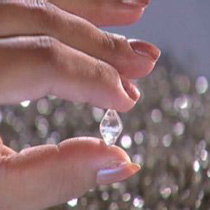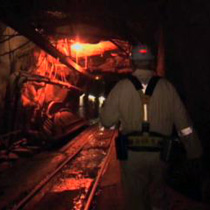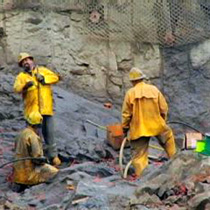-
(单词翻译:双击或拖选)
 |
| Perhaps the most fabled7 gem is the diamond |
Gem stones come from all corners of the globe, but perhaps the most fabled gem is the diamond, and its most famous source is South Africa.
For generations men have ventured deep into the earth to bring the rough stones up from mines like the Cullinan mine, north of Johannesburg. It was backbreaking work and often dangerous, but recently technology has helped.
George Oelofse worked in the mines here for nearly half a century before retiring. He still comes here to show visitors around.
"I've noticed quite a huge increase in technology in the mines [from] the way we started out," says Oelofse. "If you take this mine for instance, the pipe that is here, we had over 12,000 people, but that was hard work, that was pick and shovel8 work, and nowadays we do it with machines."
Diamonds were formed millions of years ago from carbon under extreme heat and pressure more than 100 kilometers beneath the earth's surface. They are found in volcanic9 "pipes" called kimberlite, named after Kimberley, the place in South Africa where diamonds were first discovered on the continent in the 1860's.
That discovery set off a diamond rush and frantic10 digging, and over a century later men like George Oelofse and Peter Sedibane have carried on that tradition, extracting these precious bits of mineral.
Oelofse says he would like his children to follow in his footsteps. "I have two sons but unfortunately they are not interested in mining," he says. "They've decided11 no, that was enough. I have five brothers, all of them worked in the mines as well because my Dad worked in the mine."
 |
| Sedibane has worked in the mines for 32 years |
Peter Sedibane has worked in the mines for 32 years. Speaking in his native Setswane, he says life as a miner is not bad.
"My kids stay here with me and my wife stays back home, but she comes to stay with us for three months and then goes back home to take care of the rest of the family," he explains. And, that's the way it's been for generations.
"So, lots of families had to be patient with their fathers being away, and so if anybody is out there to look and find out where their great-great grandparents were in the diamond era time, they can come here and remember what their parents and their great-grandparents did for their future," says Phenyo Marumo, marketing12 manager at the Kimberley Mine Museum.
 |
| Gems are mined from all over the world, not just in South Africa |
It's not just in South Africa. Gems are mined all over the world - from deep in the ground, from river beds, off-shore and in open gravel pits. And it's often back breaking work, men digging and sifting13 in open pits in search of diamonds.
South Africa has been surpassed by Botswana as Africa's largest diamond producer, but the stones are also mined elsewhere on the continent, including in Namibia, Angola, the Democratic Republic of Congo and Sierra Leone.
According to industry sources, Russia produced the most diamonds in 2007, and Canada came in at number three.
Men have dominated the industry, but women are getting into the business.
"I've always loved crystals," says Janine Chaveau, a diamond trader in Johannesburg, "and from that I thought that I love them so much, [then] on to the diamonds."
While the giant diamond conglomerate14 De Beers still controls about half of the world's diamond production, independent buyers like Chaveau have gotten into the trade. Chaveau says that since millions of dollars can be at stake, trading in diamonds can be risky15.
 |
| Once the trader is satisfied that the diamonds are real, the deal is made and the diamonds move on |
"Often you'll get there and they will show you the diamonds, and they will say 'this is so many million,'" she says, "and you come back the next day, and then it is [substituted with] glass."
Once the trader is satisfied that the diamonds are real, the deal is made and the diamonds move on. The dealer16 weighs them and ships them off to be cut. "I've now valued these diamonds," said Chaveau. "Now, we're parceling them to go off to India."
And, the gem's journey continues from the African mines to Asia and beyond.
 收听单词发音
收听单词发音
1
gem

|
|
| n.宝石,珠宝;受爱戴的人 [同]jewel | |
参考例句: |
|
|
|
2
gems

|
|
| growth; economy; management; and customer satisfaction 增长 | |
参考例句: |
|
|
|
3
beholder

|
|
| n.观看者,旁观者 | |
参考例句: |
|
|
|
4
shaft

|
|
| n.(工具的)柄,杆状物 | |
参考例句: |
|
|
|
5
gravel

|
|
| n.砂跞;砂砾层;结石 | |
参考例句: |
|
|
|
6
narrates

|
|
| v.故事( narrate的第三人称单数 ) | |
参考例句: |
|
|
|
7
fabled

|
|
| adj.寓言中的,虚构的 | |
参考例句: |
|
|
|
8
shovel

|
|
| n.铁锨,铲子,一铲之量;v.铲,铲出 | |
参考例句: |
|
|
|
9
volcanic

|
|
| adj.火山的;象火山的;由火山引起的 | |
参考例句: |
|
|
|
10
frantic

|
|
| adj.狂乱的,错乱的,激昂的 | |
参考例句: |
|
|
|
11
decided

|
|
| adj.决定了的,坚决的;明显的,明确的 | |
参考例句: |
|
|
|
12
marketing

|
|
| n.行销,在市场的买卖,买东西 | |
参考例句: |
|
|
|
13
sifting

|
|
| n.筛,过滤v.筛( sift的现在分词 );筛滤;细查;详审 | |
参考例句: |
|
|
|
14
conglomerate

|
|
| n.综合商社,多元化集团公司 | |
参考例句: |
|
|
|
15
risky

|
|
| adj.有风险的,冒险的 | |
参考例句: |
|
|
|
16
dealer

|
|
| n.商人,贩子 | |
参考例句: |
|
|
|















